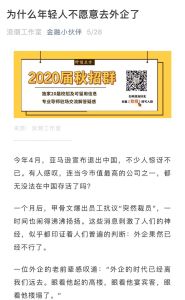Join getAbstract to access the summary!

Join getAbstract to access the summary!
Luo Jie
Why Foreign Corporations in China Aren’t as Popular Among Job Seekers as They Used to Be
Wellestudio163, 2019
What's inside?
Chinese sentiments toward foreign corporations have changed between the 1990s and 2019.
Recommendation
Chinese job seekers used to covet positions with foreign corporations. But since the late 2010s, young job seekers’ preferences have shifted toward homegrown companies. In this article from NetEase’s Wellestudio163 WeChat wemedia account on social and business trends, Luo Jie traces the evolution of Chinese views toward Western firms in China. Learn why foreign companies that used to be synonymous with wealth and sophistication have fallen from grace.
Summary
About the Author
Luo Jie writes for Wellestudio163, an official WeChat account created by Chinese internet company NetEase. Wellestudio163 focuses on history, business and current social trends.









Comment on this summary